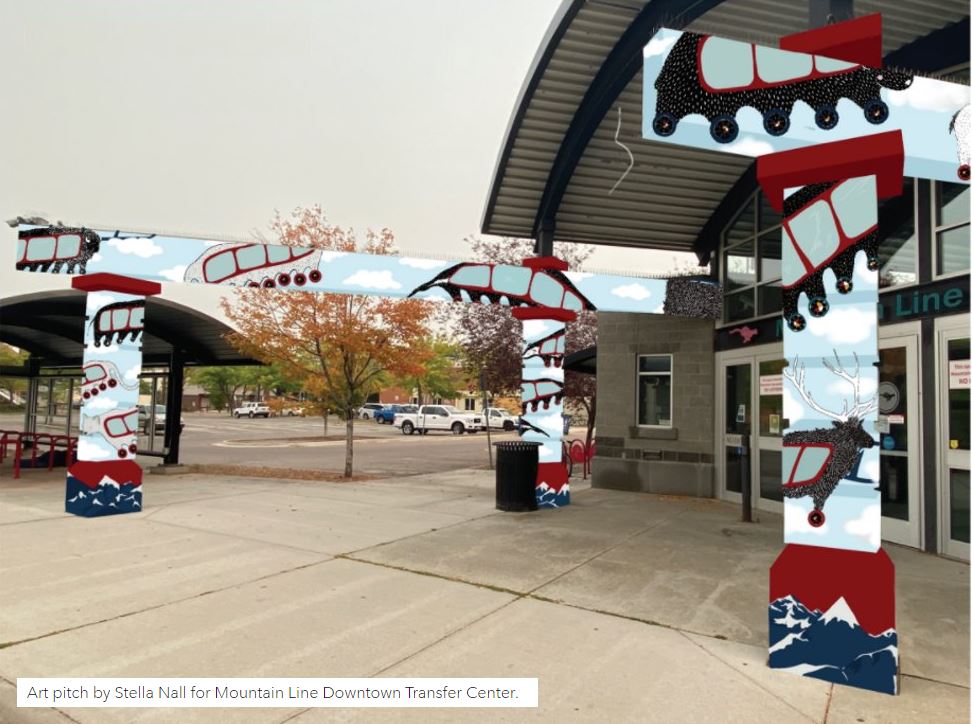MISSOULA – Starting April 1, Missoulians can expect to see new splashes of color going up at the Mountain Line Downtown Transfer Center (DTC), as artist Stella Nall gets to work on a full-scale mural outside the south entrance celebrating public transportation, sustainability and environmental stewardship.
The mural, titled “Climate Conscious Creatures Wheel Towards a Sustainable Future,” combines Nall’s whimsical style and cultural heritage with Mountain Line’s commitments to a sustainable future.
“I use a lot of symbolism in my work. Some of it is drawn from tradition, and some I develop to speak to my own experiences,” said Nall, a 23-year-old descendant of the Apsáalooke (Crow) Tribe. “I was initially drawn to this opportunity because I’m very passionate about sustainability and how we can make conscious steps toward maintaining a healthier balance with the earth.”

Nall’s design shows animals native to Montana, like bison, badgers and mountain lions, imagined as bus creatures wheeling through clean air above the mountains. Each bus has many wheels, all inspired by the form and color palate of the traditional Plains medicine wheel.
According to Nall, there are several different meanings for the medicine wheel, depending on the Plains tribe.
“The way I was taught about it speaks well to the ideas of this project,” said Nall. “Through this mural I hope to highlight our relationship with the earth and the animals that we share it with, and to advocate for making conscious decisions to care for them by choosing to live more sustainably.”
The original public art call, which launched in the summer of 2020, was a joint effort between Mountain Line and the City of Missoula Public Arts Committee (PAC). The call asked artists to visually represent Mountain Line’s commitments to sustainability and the benefits of those commitments for the entire community.
Jennifer Sweten, Director of Operations at Mountain Line and a member of the PAC review committee, said she was captured by Nall’s vision and personality.
“We loved how Stella created a direct connection between public transportation and stewardship for the environment,” said Sweten. “At Mountain Line, sustainability is one of our guiding principles, from reducing traffic congestion and helping keep our air clean, to committing to a zero-tailpipe-emissions fleet by 2035.”
Kathi Olson, acting chair of the PAC, said she couldn’t imagine a better pairing than Mountain Line and Nall.
“There are many factors that go into building a healthier more equitable community,” said Olson. “And we see three of them coming together in this project: supporting public art, BIPOC representation, and sustainable, accessible public transportation.”
Nall will be working on the installation throughout the month of April. Originally from Bozeman, she came to Missoula to attend the University of Montana, graduating in 2020 with a bachelor’s in psychology, a Bachelor of Fine Art in printmaking, and a minor in art history and criticism. Nall is now embracing life as a full-time artist. She has worked on smaller-scale projects throughout the community over the past couple of years, ranging from artistic design for Clyde Coffee to the Zootown Arts Community Center Mural Alley Project. The installation at the DTC will be the first time Nall has worked on such a challenging landscape, involving three textured concrete pillars and two large beams.
You can see more of Nall’s work at www.stellamarieart.com and can catch her in action throughout the month at 200 W Pine St.
Mountain Line and the PAC ask that all visitors be respectful of Nall’s space as she works and remind visitors that masks are required at all times while at the DTC.
A First Friday designation celebration is planned for May 7.
###
In 2020, Mountain Line committed to a zero-tailpipe-emissions fleet by 2035. This action solidified Mountain Line’s long-standing commitment to clean air, public health and a more sustainable future. Mountain Line became a zero-fare system in 2015, made possible through partnerships with local government, businesses and nonprofits. Since the debut of Zero-Fare, ridership has increased 70 percent. During normal times, Mountain Line provides more than 1.5 million rides annually, helping students get to school, employees get to work, and helping seniors and people with disabilities stay active, mobile and independent. By reducing the number of single vehicles on the road, lessening traffic congestion and investing in electric buses, Mountain Line benefits us all.